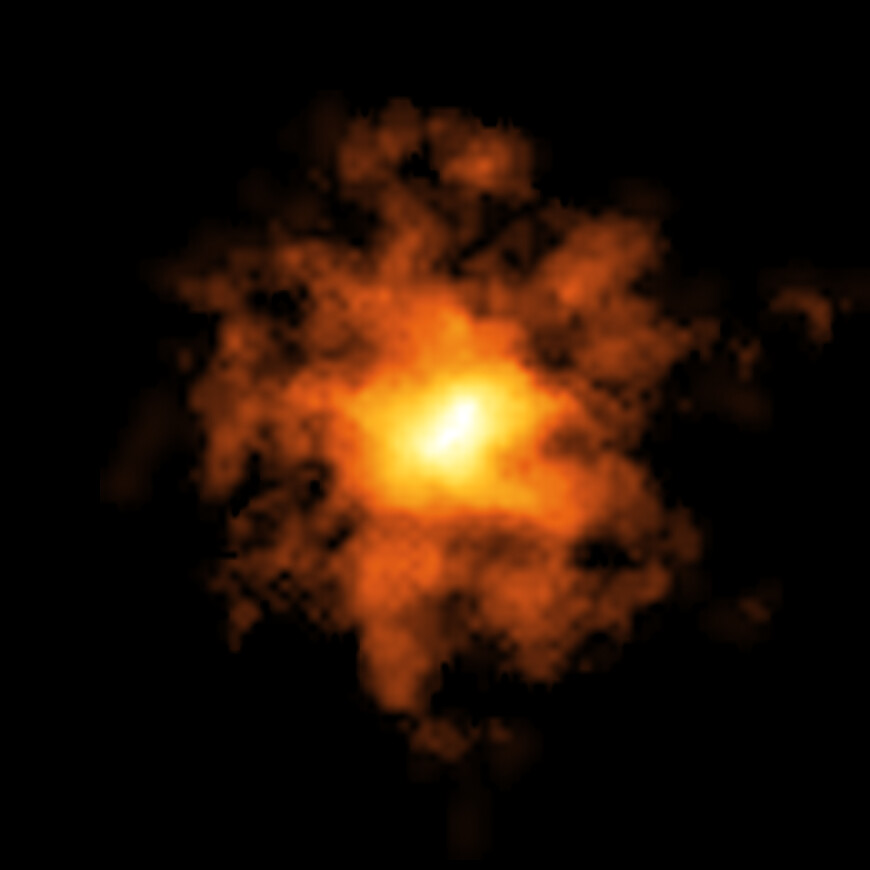Most Distant Rotating Disc Galaxy Found

REBELS-25 as imaged by ALMA. Credit: ALMA (ESO/NAOJ/NRAO)/L. Rowland et al.
The Reionization Era Bright Emission Lines Survey, an ALMA Large Programme, has discovered the most distant rotating disc galaxy ever observed. This object, which has been designated REBELS-25, is at a redshift of z=7.31. The disc was mapped and the rotation was measured using observations of the [CII] line at 158 microns, which was redshifted into ALMA Band 6. These results illustrate that disc galaxies could be much more common in the early universe than previously anticipated and present new challenges to modelling the formation and evolution of galaxies.
Additional images can be found in the press release. More information can be found in the publication, which is currently online in preprint form on arXiv and will later be published in Monthly Notices of the Royal Astronomical Society.
Cycle 11 Underway
ALMA Cycle 11 observations started on 1 October. A total of 245 Grade A and B proposals have been scheduled for the telescope, amounting to a total of 4107 hours on the 12-m Array, 2204 hours on the 7-m Array, and 2203 hours on the Total Power Array. This includes four Large Programs. The full list of these programs can be accessed from the ALMA Science Portal.
Although observations have already started, PIs who have been awarded observing time should still review their observing programs to ensure that they don’t need to make any changes. ALMA users who may need help should contact their local ARC or ARC Node through the ALMA Helpdesk.
UK ALMA 2025 Hybrid Workshop
20-22 January 2025 (registration deadline: 15 November 2024)
Nancy Rothwell Building 3A.016, The University of Manchester
Manchester, United Kingdom
Website
This workshop will provide an introduction to ALMA and instructions on how to work with data from the observatory and will include sessions on preparing proposals, downloading data from the ALMA archive, calibrating and imaging ALMA data. While the workshop is aimed primarily at novice ALMA users, particularly from the United Kingdom, other users with higher levels of experience or from other locations are also invited to attend.
The workshop is scheduled from Monday, 20 January, to Wednesday, 22 January in room 3A.016 of the Nancy Rothwell Building, which is located at the north end of the main campus. However, participants may also join remotely if needed.
To participate in the workshop, please complete the registration form. The deadline to sign up is 15 November.
Applications Invited for UK ALMA Research Associate
Job advertisement
Application deadline: 15 November 2024
Applications are invited for a research associate position in the UK ALMA Regional Centre Node headed by Prof. Gary Fuller at the JBCA. The holder of this position will play a leading role in the UK ARC Node and EU ARC user support, science and development activities. The appointee will spend 75% of their time as part of the team supporting astronomers planning ALMA observations, acquiring and processing data. For the remaining 25% of their time the successful candidate will be expected to engage in their own independent research program focused on ALMA science.
This is a full-time post available from 1 January 2025 and will be offered on a fixed-term contract for 26 months. The UK ARC Node policy is to maintain a stable group of staff and so the position is likely to be extended for future years depending on funding and performance.
The link to the application submission site and additional information about the position can be found on the webpage for the job advertisement. Applicants should submit a CV and publication list, the name and email addresses of three people who have agreed to provide references together with a research statement 2-3 pages in length outlining their research skills and experience, and plans for how they would apply these in this position. The closing date for applications is 15 November 2024.
e-MERLIN Invitation for Proposals
Website
Deadline: 24 October 2024
e-MERLIN requests proposals from the international astronomical community for observations to be made during Cycle-19. e-MERLIN observations address a broad range of science topics listed on their science research webpage, and its unique combination of angular resolution (mas) and sensitivity (microJy) provide crucial insights in multiple science areas. The observatory can provide high angular resolution (12 - 150 milliarcsec) and high sensitivity (microJanksy) imaging at cm wavelengths as well as polarimetry, spectroscopy, and astrometry.
More information about the invitation for proposals can be found on this webpage. The deadline for proposal submission is 24 October 2024 at 13:59:59 UT.
UK ALMA Regional Centre Support Information and Contact Details
The UK ALMA Regional Centre Node is available to provide support to people working with or interested in working with ALMA. This may include help with preparatory data analysis, including the use of archival data, proposal and observing preparation, data calibration and imaging, and subsequent data analyses. We can also provide computing facilities for ALMA data processing and training for individuals or groups of people.
If you have any ALMA science results that they want to share with the UK ALMA community, please contact us, and we will endeavour to include those results in our next newsletter and on our website.
For any ALMA-related queries or support requests, please contact the UK ARC Node via the following:
ALMA Helpdesk: help.almascience.org
Email: (see our contact page)
Web: www.alma.ac.uk

